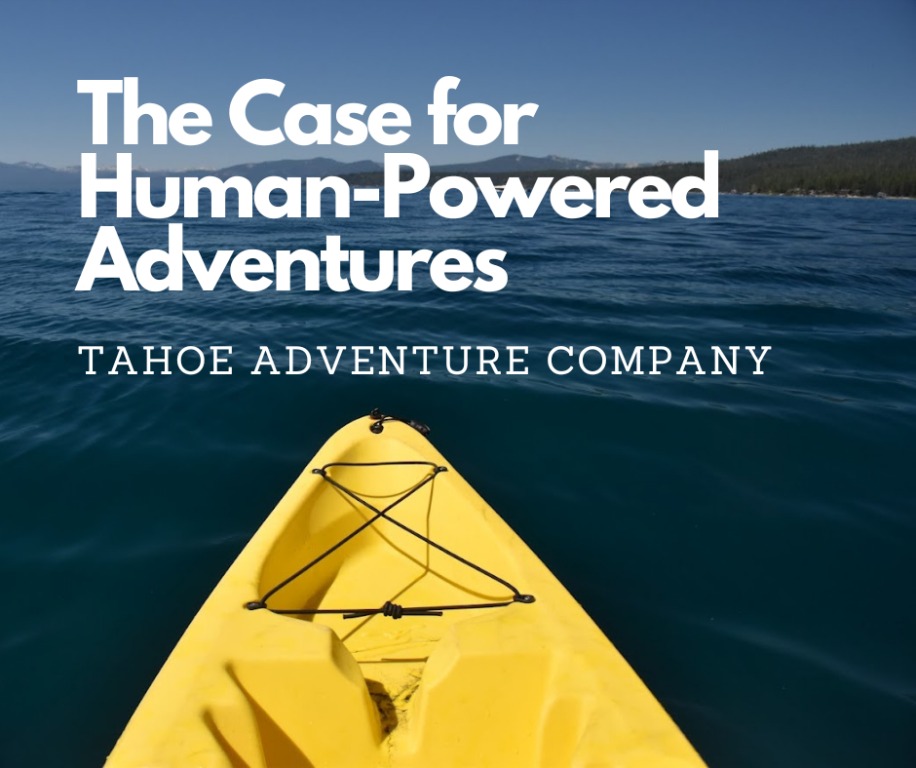
The Case for Human-Powered Adventures
Category:
In the Lake Tahoe basin, opportunities for adventure abound. You can take a tram up a mountain to wander around some of the highest peaks in the region. You can jet-ski in circles on the lake. You can take a 10 minute plane ride to jump out and skydive back down. These things are incredible–and it’s incredible that you can spend just a week in Tahoe and achieve so many adventurous bucket-list items. The problem is that these things take away the very challenge of adventure sports. The early rock climbers, mountain bikers, even skiers and snowboarders–they weren’t looking for ways around the climb, they were looking for the climb itself. At Tahoe Adventure Company, you won’t find a single motor–not electric, not gas, nothing more than the human-powered engines we have built-in propelling us across the lake, up the hill, down the mountain. We champion “human-powered adventures” because true adventure requires commitment, connection, challenge, and most of all: time. Sure, you’ll end the day sweatier and more sunburnt than those who opt for the easy adventure, but I’ll bet that you’ll end up happier and more satisfied, too.
Before even considering why human-powered adventures bring more value to a vacation, let’s talk about the practical matters. If you pay attention to the outdoor world, you’ll know that until very recently, it’s been exclusively for people with an abundance of time and money. Ski-doos are expensive. Electric bikes, motor boats, airplanes–it seems like the faster you go, the more you spend. Not to mention the environmental impact: all the gas motors and jets that seem to be central to so many adventure sports these days are just pumping more pollution and carbon dioxide into an already oversaturated atmosphere. In the Tahoe area, where wildfires threaten homes, outdoor playgrounds, and the very air we breathe–and where we know that human-started wildfires are more damaging than any natural fires–I can’t help but wonder how many bicycles or kayaks have contributed. A hell of a lot more fires are started by engines and vehicles than any human-powered machine. Beyond price and risk, human-powered adventures are simply easier to get started. To hike, you need shoes. To kayak, just a boat and a paddle. To bike, only a bike and a helmet. You don’t need several thousand dollar speedboats, you don’t need any certifications nor special clothes; you certainly don’t need all the expensive gear the outdoor industry tries to convince you you need. You just need to show up–meaning that anyone can start anywhere at any time.
Picture this: you and your family go jet-skiing every summer on Lake Tahoe, but this year, you opt for a kayak tour on the north shore instead. You don’t go as fast, maybe you don’t get the same thrills, but the stillness quiets you. Your kids are talking to each other, asking your guide questions about the natural history of Lake Tahoe, wondering in quiet awe how all of this got here. You peer down over the edge of the kayak to see 60ft down in the water, something you never noticed before on the jet ski. You feel the power of your body propelling your boat through the water, you’re remembering to take deep breaths, to absorb every tree and pebble you can see. The mental health impact of spending time in nature is undeniable–lower stress, better mood, and even reduced risk of psychiatric disorders. This effect is even stronger when exercising in nature–perhaps the very feeling of using your body for how it works rather than how it looks is important in today’s culture. Not to mention the relationships we build with each other–anyone who has spent an evening, without phones, around a campfire can tell you that the relationships and connections we build with each other when in nature are stronger and truer than anywhere else. Speaking of phones–lack of service, proximity to water, and the desire to conserve battery all contribute to phones being less of a Thing in human-powered adventures. Without phones to monopolize our attention, we can focus on the things that really matter.
Now, all of this might sound like a lot of extra work, but that’s the entire point. Exercising your mind and body grows brain cells, and doing challenging things on purpose builds confidence, helps you get to know yourself, and encourages agency and control in your life. The benefits are many and the drawbacks are few–spend less, connect more, and build components of a good life that truly can last. After all, no true adventurer did more work to avoid the climb–they just tackle it, step by step, and when they get to the top, they feel better for it. Don’t cheapen value with ease and convenience–be the power behind your human-powered adventure.
Share this:






